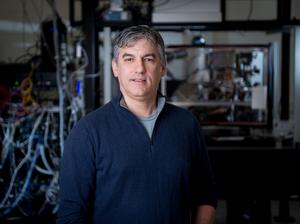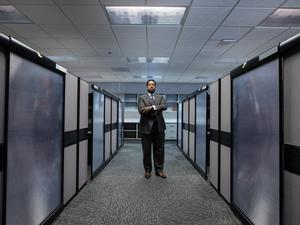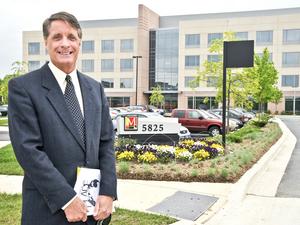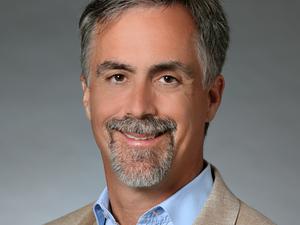
IonQ Inc. is used to moving with speed, as it’s the very nature of the company’s work.
Formed in 2015 in College Park, the quantum technology firm is about to make its way to the New York Stock Exchange with a $2 billion valuation and as a major player out in front of the next revolution in computing.
The company, which has garnered both attention and investment from some of the biggest players in the technology space, announced Monday its intent to file for to go public by way of a merger with a special purpose acquisition company, or SPAC. The Las Vegas-based company, dMY Technology Group Inc. III, was founded by Harry You, former CEO of information technology consultancy BearingPoint and former CFO of Oracle Corp. and Accenture PLC.
IonQ President and CEO Peter Chapman said one of the longtime goals of the company, which would trade as "IONQ," was to go public, if only to provide it more runway to develop its cutting-edge technology at a faster rate.
“I think it’s every little boy’s dream to go public,” Chapman said in an interview with the Washington Business Journal. “Being a public company, first, allows us to raise quite a bit of money, which gives us the resources to compete with the big guys. Private companies are at a potential disadvantage in hiring because my competitors get to use their public stock in hiring employees. Employees generally value public stock more than private because it’s not liquid and they don’t know the value of it.”
Chapman also said that after years of raising money from big-name investors like Amazon Web Services and Lockheed Martin Corp. (NYSE: LMT), going public allows the company to focus more on the development and scaling of its technology rather than splitting time to draw more needed capital from other investors. The company last closed on an $84 million round in July., following $14 million in raises in 2017.
As for why it decided to partner with a SPAC, the CEO said one company adviser — Jagdeep Singh, founder and CEO of San Jose electric vehicle battery startup QuantumScape Corp. (NYSE: QS) — had successfully leveraged the popular investment tool to take his company public.
“So we thought, OK, this seems like a good path for IonQ to go down, so we started this process,” Chapman said.
Finding the right SPAC to partner with was a bit of challenge, as it required going into business with someone who could understand the quality of the technology that IonQ was producing.
Quantum technology, explained
IonQ began with more than two decades of research done by University of Maryland Professor Chris Monroe and Duke University Professor Jungsang Kim into the nascent field of quantum computing.
By ionizing the atoms of rare Earth element ytterbium, the pair found they could “trap” those ions on a specialized chip and hold them in a steady state, then use laser technologies to create quantum bits, or qubits, from the ions. If a bit serves as the basic unit of computing power in traditional technology, represented as either a one or zero, then a qubit is the combination of both the one and the zero at the same time.
By using quantum physics to entangle or superposition the one and the zero into the same value state, quantum computers can provide dramatically more computing power than today’s technology, and IonQ executives think their technology can do so at a more stable, reliable capacity.
With every technology advancement and a greater number of qubits used to compute, the company could potentially accelerate toward producing a quantum computer that can reach the marker known as quantum supremacy, or quantum advantage — a device that can solve complex mathematical problems that no classical computer can.
The value of that technology was not lost on Niccolo de Masi, CEO of dMY Technology Group Inc. III, and neither was Chapman’s ability to attract investment to help the company grow at a faster rate.
“IonQ has had tremendous breakthroughs the last three years,” de Masi said. “Our assessment is that he has moved forward the era of quantum advantage by three to five years. In 2017, we were talking [quantum advantage] in the late 2020s or 2030. We think IonQ will do this in the mid-2020s, and that’s why we think now is the time to fully capitalize on his technical milestones, on his capitalization and really build the stand-alone, pure-play leader in the field globally.”
De Masi will join IonQ's board at the close of the transaction, along with dMY Chairman Harry You. Craig Barratt, formerly of Intel, Google and Atheros, will join the board immediately. The company announced two other appointments after Monday's merger news: former Opower CFO and Remarque Advisory Managing Director Thomas Kramer as CFO, and former Uber Chief Legal Officer Salle Yoo as chief legal officer and corporate secretary.
New epicenter
Publicly in the marketplace, Chapman said IonQ can now compete with bigger companies that have developed their own quantum technology but haven’t solely focused their investments in the market, such as IBM Corp. and others.
That growth is not only projected for the company itself, but also the surrounding area. With its roots entrenched in research done at the UMd., Chapman said he expects the ancillary innovation needed to capitalize on quantum technology, such as software applications, will draw more opportunity to College Park.
“I think obviously, with this announcement, it really makes College Park the epicenter for the quantum world,” he said.
UMd. President Darryll Pines agrees. He said the school is continuing its support of ongoing research and development into quantum information science, backed by both federal and state support.
“This is just one start. We have a whole bunch of activities, research and startups that are incubating at our university and outside of our university,” said Pines, noting that ongoing programs are exploring areas like quantum navigation, quantum communications, quantum sensing and others.
As for Chapman and IonQ, the CEO said the company is working on a rack-mounted, room-temperature quantum computer and will leverage its new public capital to help build out a manufacturing capacity to serve it.
“There’s lots of things to do,” Chapman said. “Basically, it’s all about productizing our products.”
